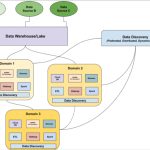From the minute an entrepreneur has an idea for a business, the story is written by data and decisions based on it. Data shows whether there's a need and a market for the product/ service. It helps you set good price points, strategize marketing campaigns, establish practices that will keep customers happy and more. It goes without saying that you need good data to make the … [Read more...] about How Data Governance Can Help Your Decision-Making
Big Data
Learn everything you need to know about big data. Find out how companies are using this revolutionary technology and what it means for your business strategy.
Data Catalogs Are Dead; Long Live Data Discovery
It's no secret: knowing where your data lives and who has access to it is fundamental to understanding its impact on your business. In fact, when it comes to building a successful data platform, it's critical that your data is both organized and centralized, while also easily discoverable. Analogous to a physical library catalog, data catalogs serve as an inventory of metadata … [Read more...] about Data Catalogs Are Dead; Long Live Data Discovery
5 Important Things to Know About Securing Your Crypto Assets
Crypto investing is bigger than ever before all over the world, and as of December 29, 2021, the global crypto market capitalization is $2.21 trillion. While there will always be ups and downs when it comes to the value of certain coins, it will always be a high-risk-high-reward investment, there is no denying that crypto investing is going to rise further in the years to … [Read more...] about 5 Important Things to Know About Securing Your Crypto Assets
Can Big Data Help Us Stop Human Trafficking?
Big data has been celebrated for its potential on countless occasions - for its capacity to eliminate food waste, reduce fraud and cyberattacks, disrupt urban planning, and to revolutionise the healthcare industry through machine learning. But today it is being lauded for something even greater - to eliminate the global problem of human trafficking. Until now, the traditional … [Read more...] about Can Big Data Help Us Stop Human Trafficking?
Improving Consumer Experience Through Big Data
Big data and conversion rates. That's what everyone is talking about nowadays. If you are preparing for the interview of a marketing position or the head of advertising, you had better get yourself well-versed in the new trends that are rocking the marketing world. Gone are the days of blindly throwing around advertisements, hoping that your target demographic will notice you. … [Read more...] about Improving Consumer Experience Through Big Data
What is big data?
Big data is a term that refers to the massive amount of digital data created and shared every day. Big data can transform how we live, work, and communicate. It can be used to improve everything from public health and urban planning to business and marketing.
Big data is also changing the way we think about privacy and security. The volume, velocity, and variety of big data present challenges and opportunities for organizations and individuals. Regardless, big data is here to stay, and its impact will only continue to grow in the years to come.
What is big data analytics?
Big data analytics is the process of turning large, complex data sets into actionable insights. Businesses use various analytical tools and techniques, including machine learning and statistical analysis, to do this.
Big data analytics can be used to improve decision-making in areas like marketing, operations, and customer service. It can also be used to identify new business opportunities and optimize existing processes. With the help of big data analysis, businesses can gain a competitive edge by using their data better.
Want to learn more about big data? Datafloq has courses available. Contact us to get started.
When was big data introduced?
The term big data was coined in the 1990s, with some giving credit to John Mashey for popularizing the term. However, the concept of big data has been around for much longer.
Where does big data come from?
In the early days of computing, scientists and businesses began to realize that the amount of data being generated was increasing exponentially. As a result, they began to develop new methods for storing and processing data.
Over time, these methods have become increasingly sophisticated and have played a key role in enabling businesses to make sense of vast amounts of information. Today, big data is used in various industries, from retail to healthcare, and its importance is only likely to grow in the years to come.
What are examples of big data?
One of the most common examples of big data is social media data. With over 2 billion active users, Facebook generates a huge amount of data every day. This includes information on user interactions, posts, and even location data. Analyzing this data can help companies better understand their customers and target their marketing efforts.
Another example of big data is GPS signals. These signals are constantly being generated by devices like cell phones and fitness trackers. When combined with other data sets, GPS signals can be used to provide insights into everything from traffic patterns to human behavior. Finally, weather patterns are another type of big data set. By tracking these patterns over time, scientists can better understand the impact of climate change and develop strategies for mitigating its effects.
How do companies use big data?
Companies use big data in marketing, product development, and customer service. By analyzing large data sets, businesses can identify patterns and trends that would be otherwise difficult to spot. For example, a company might use big data to track customer behavior patterns to improve its marketing efforts.
Alternatively, a company might use big data to improve its products by identifying areas where customers are most likely to experience problems. For instance, big data can be used to improve customer service by finding pain points in the customer journey. Ultimately, big data provides companies with a valuable tool for gaining insights into their business operations.







